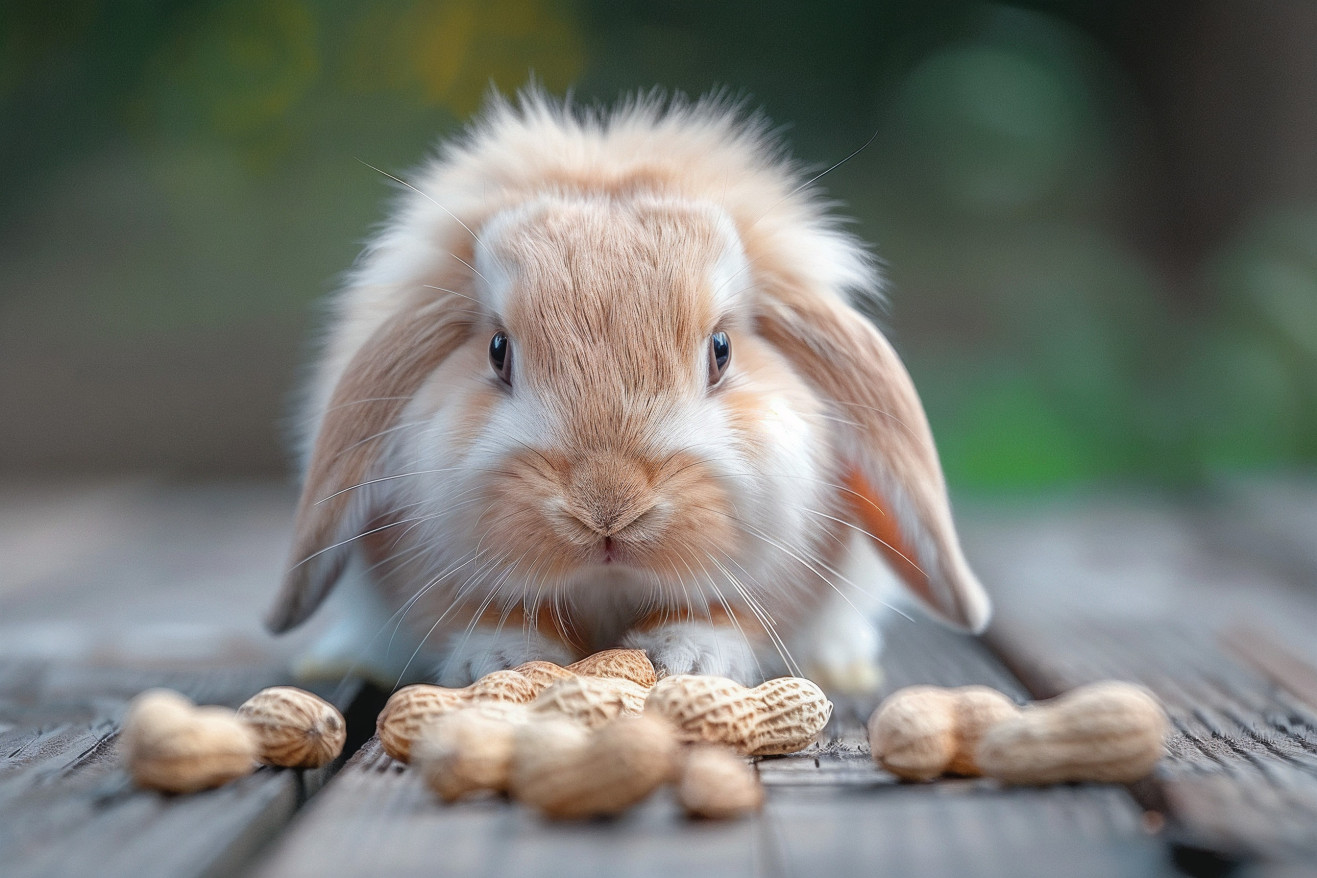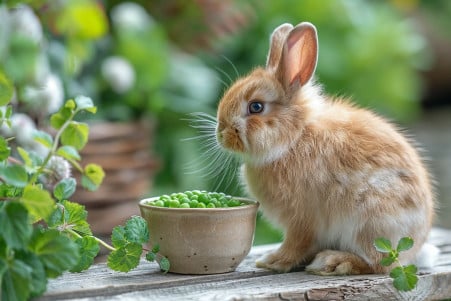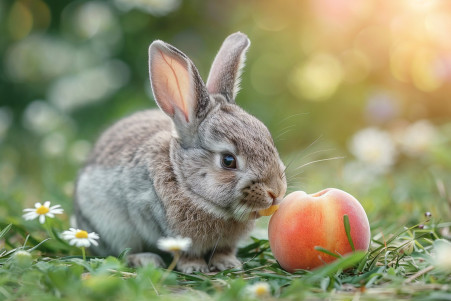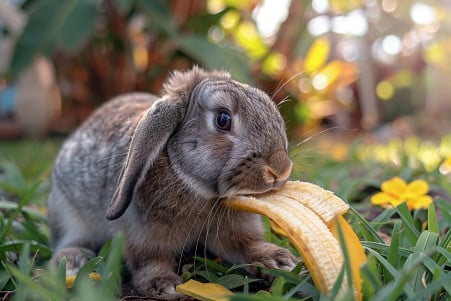Can Rabbits Eat Peanuts? The Need-to-Know Risks and Benefits
14 June 2024 • Updated 13 June 2024

If you’ve ever wanted to share your favorite peanut-based snack with your pet rabbit, you may have asked yourself, “Can rabbits eat peanuts?” While the answer is technically yes, there are some important caveats to consider. For one, peanuts should be fed to rabbits in moderation, as they are high in fat and calories and can contribute to obesity and other health problems.
This article will cover veterinary and nutritional studies that have investigated the dietary requirements of rabbits, the potential dangers of feeding peanuts and peanut-based products to rabbits, and advice from animal professionals on the best ways to supplement a rabbit’s primarily hay-based diet with treats. By learning about the biology of a rabbit’s gut, you can make better choices about how to create a well-rounded, rabbit-friendly diet.
Can rabbits eat peanuts?
What Do Rabbits Eat? The Role of Hay and Fiber in a Rabbit's Diet
Rabbits have a unique digestive system that's designed to extract the maximum amount of nutrition from fiber. According to The Rabbit Haven, hay should make up the bulk - approximately 80-85% - of a rabbit's diet, and it's the primary source of fiber that rabbits need to keep their digestive systems running smoothly. That's why it's important for rabbits to have unlimited access to high-quality hay, such as timothy or oat hay, to keep their digestive systems healthy and prevent problems like gastrointestinal stasis.
If rabbits don't get enough hay, they can experience a number of health issues. According to The San Diego House Rabbit Society, these problems include dental disease, obesity, and digestive problems. That's why it's so important to introduce hay early and make sure it's the most important part of a rabbit's diet, as noted by Vets4Pets.
Knowing this, rabbit owners can make sure they're setting their pets up for a healthy, fiber-rich diet that's built on a foundation of hay. Once that foundation is in place, it's time to look at how to add other foods, like vegetables, and even the occasional treat.
Peanuts in a Rabbit's Diet: Moderation and Concerns
Rabbits can eat peanuts in moderation, but their high fat and calorie content can contribute to obesity if rabbits are given too many. According to Bunny Eat, peanuts should be considered a treat and not a regular part of a rabbit's diet. Rabbits should be given peanuts in moderation, and portion sizes should be limited, with many experts suggesting that a rabbit should not be given more than a few peanuts a week.
In addition, rabbits can be allergic to peanuts, which can cause digestive upset and other problems. Oxbow Animal Health notes that peanut butter and peanut shells are not recommended for rabbits and can pose additional risks. It's also important to introduce new foods to rabbits slowly and watch for signs of digestive upset to avoid gastrointestinal problems in rabbits.
While peanuts can be a source of some important nutrients, their high fat content means they should be given in moderation and as a treat. It's important to make sure that rabbits are getting a balanced diet that includes hay, vegetables, and a small amount of pellets to ensure that they are as healthy as possible.
How to Balance a Rabbit's Diet: Vegetables, Fruits, and Pellets
In addition to hay, rabbits need a balanced diet that includes fresh vegetables, a small amount of high-fiber pellets, and occasional fruits as treats. According to Rabbit.org, 75% of a rabbit's vegetable intake should be leafy greens, while the other 25% should be non-leafy greens.
Rabbits can also eat edible flowers and plants, but Oxbow Animal Health notes that some vegetables, including onions and potatoes, are toxic. Fruits should be fed in small amounts due to their high sugar content, with Best Friends Animal Society suggesting that the average rabbit eat no more than 1-2 tablespoons of fruit a day.
VCA Animal Hospitals says that timothy hay-based pellets should be fed in small, controlled amounts based on the rabbit's age and weight, usually no more than 1/4 cup per 5 pounds. By adding these other elements to the diet in moderation, rabbit owners can make sure their pets have a well-rounded, nutritious diet.
How To Spot Malnutrition and Maintain a Healthy Rabbit Diet
Rabbits can suffer from a number of health problems if their diet isn’t balanced, including dental issues, obesity, and gastrointestinal problems. According to Rabbit Diet 101: What To Feed Your Rabbit, some signs of malnutrition or an unbalanced diet in rabbits are changes in eating habits, changes in poop, weight loss, and a dull coat.
It’s important to make sure that new foods are introduced slowly and that rabbits are monitored for any signs of digestive issues. This is because, as Folly Road Animal Hospital points out, rabbits have very sensitive digestive systems that can be thrown off by sudden changes in their diet.
It’s also important to note that a rabbit’s dietary needs can change as they age. For example, Anti-Cruelty notes that younger rabbits need more alfalfa hay and pellets, while older rabbits or rabbits that are overweight may need to have their diets adjusted. A rabbit-savvy vet can help rabbit owners make sure that their rabbit’s diet is meeting their individual nutritional needs and that it’s helping to prevent any potential health problems.
By learning how to spot malnutrition and making sure to adjust a rabbit’s diet as needed, rabbit owners can help their pets stay as healthy as possible. With the right feeding routine and schedule, rabbits can be healthy and happy on a diet that’s based on hay.
Feeding Schedule and Routine: Making Sure Your Rabbit Gets the Right Nutrition
Rabbits need a feeding schedule and routine to make sure they get the right nutrition and maintain good digestive health. According to VCA Animal Hospitals, hay is the most important part of a rabbit's diet and should be available at all times in unlimited quantities. The Rabbit Haven says that fresh vegetables should be given daily, with at least 1 heaping cup per 5 pounds of body weight.
Pellets should be given in controlled amounts based on the rabbit's age and weight, and they should not exceed 1/4 cup per 5 pounds of body weight, according to VCA Animal Hospitals. In addition, fresh water should be offered and replaced daily to make sure the rabbit stays hydrated.
A feeding schedule that prioritizes unlimited hay, controlled pellets, and plenty of fresh vegetables will help make sure that rabbits get the nutrition they need to stay healthy. When a diet is based on a balance of hay, rabbits can stay healthy and avoid any nutrition-related health problems.
Conclusion: How to Make Sure You're Feeding Your Rabbit a Healthy Diet
Rabbits have specific dietary requirements that need to be met in order to ensure their health and happiness. A healthy diet for rabbits includes a variety of foods, but the majority of their diet should be made up of unlimited hay, fresh vegetables, a small amount of high-fiber pellets, and occasional fruits as treats.
As noted in Rabbit Diet 101: What To Feed Your Rabbit, hay should make up approximately 85% of an adult rabbit's diet and is essential for providing the fiber that rabbits need to maintain a healthy digestive system. When feeding vegetables, 75% of the vegetables should be leafy greens, and 25% should be non-leafy greens. Pellets should be fed in amounts that are appropriate for the rabbit's weight and age.
Peanuts should be fed in moderation and only as an occasional treat because they are high in fat and calories and can lead to obesity and other health issues if they are overfed. Bunny Eat suggests that a few peanuts per week is a safe amount for an average-sized rabbit.
To avoid health issues related to diet, rabbits' food should be portioned out, new foods should be introduced slowly, and a vet should be consulted if there are any questions or concerns about a rabbit's diet. By knowing how a rabbit's digestive system works and making sure to feed them a diet that is appropriate for their needs, rabbit owners can make sure that their pets are healthy and happy for years to come.


